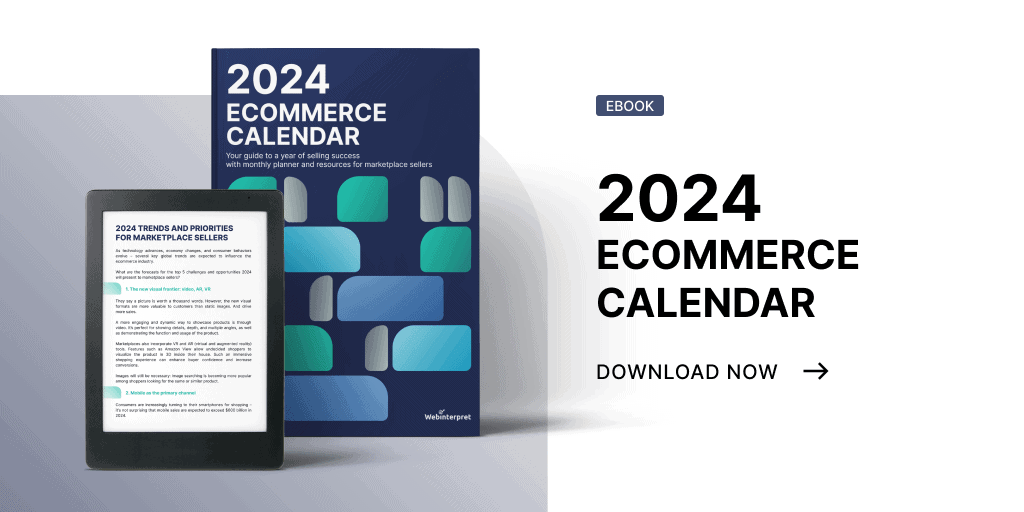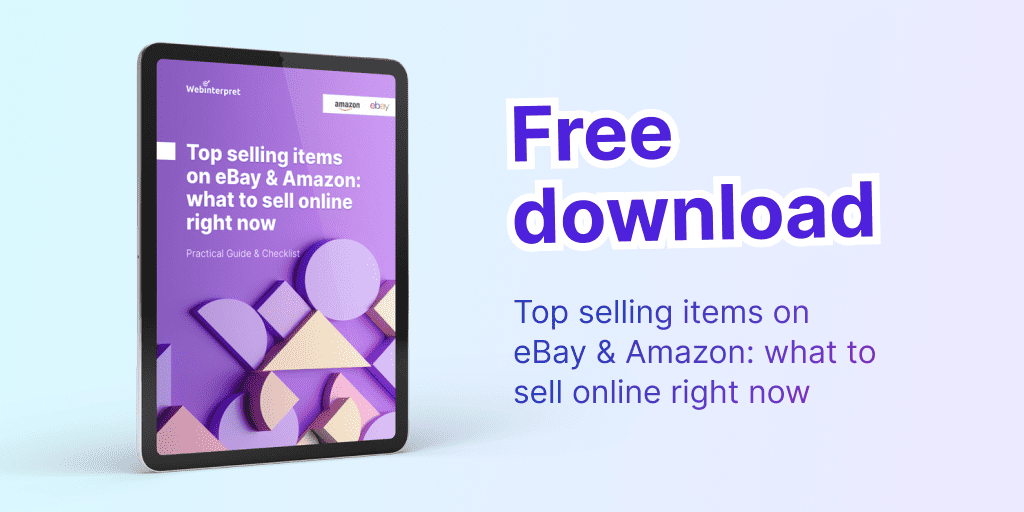
5 ecommerce and marketplace trends to grow sales in 2024
As technology advances, the economy changes, and consumer behaviors evolve – several key global trends are expected to influence the ecommerce industry and sales environment.
What’s more, the world of cross-border trade and online shopping is more competitive than ever. Businesses need to make an extra effort to stand out and establish their presence.
What are the forecasts for the top 5 trends 2024 will present to online sellers?
Based on insights from Webinterpret’s ecommerce experts, this article will talk about:
- Top challenges and opportunities in a marketplace-centric digital economy.
- Facts, stats, definitions, and useful data to help online merchants grow their sales effectively & efficiently.
- Expert recommendations to help sellers keep up with the current ecommerce tendencies and much more.
[Download your free copy of the 2024 Ecommerce Calendar and start planning your sales strategy NOW]
Click the links below to go directly to the ecommerce trend of your interest:
#1 ecommerce trend: More focused global marketplace expansion
#2 ecommerce trend: Sustainability in ecommerce
#3 ecommerce trend: Accessibility of AI technology and machine learning
#4 ecommerce trend: Mobile as a primary shopping channel
#5 ecommerce trend: The new visual frontier, video, AR, and VR
#1 ecommerce trend: More focused global marketplace expansion
When it’s difficult to compete on the domestic ecommerce scene, international marketplaces can give online sellers a competitive advantage. Established ecosystems of marketplaces like eBay and Amazon are a great way to test out the sales potential in unfamiliar territories.
In recent years, they were forced to compete with the rising popularity of niche marketplaces. They had to adapt to satisfy the needs of experienced buyers in search of specific products.
As eBay CEO James Iannone has said in an interview for Fortune:
We had become too much of a one-size-fits-all marketplace, and our customer satisfaction was lagging, so we picked focus areas.
This is how marketplace giants such as Amazon and eBay ended up offering a complete range of specialized product categories, such as luxury fashion or auto parts and accessories.
Together with them, seller solutions and programs tailored to specific focus categories, such as eBay’s Authenticity Guarantee for luxury fashion or Confirmed Fit fitment functions on Amazon Automotive, were introduced.
These platforms offer unparalleled visibility, accessibility, and convenience. Sellers can showcase niche products to a vast audience, tapping into a previously unimaginable global market reach. It’s also reshaping how consumers search for and purchase such products.
Previously, niche marketplaces were winning customers with experiential and inspirational shopping experiences like concept stores or boutiques. Now, big ecommerce platforms combine the luxury of accessing niche products with unprecedented ease of utilitarian, customer-friendly shopping.
At the same time, their reputation automatically builds consumer trust. It allows potential customers to engage with brands with bigger buyer confidence.
Additional in-depth knowledge of specialized products can position sellers as an authority in such specific market segments. Providing online shoppers with authentic expertise can be a way for retailers to set themselves apart from competitors.
[Accelerate Marketplace Growth with Auto Parts and Accessories:
FREE Download]
The benefits of selling specialized categories of products on global online marketplaces:
- Increased trust: with better security technology, shoppers are more willing to buy from big platforms. Customer trust and loyalty is also earned by specializing in one area.
- Targeted features: take advantage of innovative targeted solutions and programs tailored to specific focus categories.
- Extra earning possibilities: products are much easier to cross-sell or up-sell.
Category focus on international marketplaces: insights from Mike Bishop
A focus on a narrow product range means focus on quality, not quantity, which often goes hand in hand with high quality user and customer experience. However, there are more potential benefits for specific categories to explore.
Sellers must be laser-focused on getting the right products in front of the right people. For merchants who haven’t focused on international selling before, now may be a good time to review the opportunity. eBay and Amazon sellers should also test markets with less competition.

It’s crucial for online sellers to ask the right questions to achieve the best possible ROI:
- Do you already offer goods from one specific category that are purchased regularly and/or by a lot of people?
- Do you sell unique, high-value items?
- Are you utilizing all the automated and tailor-made solutions to streamline your sales process?
- Is there any market where you see a revenue decrease, and have you researched the same category in another region?
Answering such questions will help you better understand where you should sell your products and it’ll help you reach the right buyers.
[Best-sellers on eBay and Amazon: FREE Download]
#2 ecommerce trend: Sustainability in ecommerce
In recent years overall environmental concerns have deepened, mostly due to climate change. This trend started with niche sellers capitalizing on a smaller group of eco-conscious buyers looking for natural, organic products, handcrafted alternatives, or DIY kits. Today, sustainability and ethical practices have become major issues for ecommerce.
More and more shoppers are looking for products and brands that align with their eco-friendly values.
Sustainability is becoming increasingly important, especially among younger generations. According to a report from First Insight, 62% of Gen Z shoppers prefer to buy from sustainable brands, and
73% are willing to pay more for sustainable products.
Consumers of other ages are also increasingly looking for environmentally conscious products and choose responsible business practices whenever possible.
Online retailers’ take on environmental issues is definitely important for customers, if not even a deal-breaker for some. Simply put, prioritizing sustainability can give online businesses a competitive edge and the opportunity to sell more. According to research from IBM and the National Retail Federation:
- For 81% of consumers, sustainability is an important factor in their purchasing decisions
- 57% of consumers are willing to change their shopping habits to reduce negative environmental impact
- Most respondents would pay an average premium of 35% for an environmentally responsible brand.
Today, online sellers have a remarkable opportunity to pave the way for eco-conscious practices in various ways. After all, it’s all a joint effort to be mindful of ecommerce’s environmental impact.
The number of customers who are supporting sustainability in ecommerce is increasing year by year in every country – and governments and policymakers are addressing that trend from a legislative point of view. We see global environmental policies and ecotaxes being rolled out across the globe, e.g., Extended Producer Responsibility (EPR).
As governments are trying to address environmental challenges and promote a more sustainable, resource-efficient, circular economy, online retailers can expect changes in their recycling compliance requirements.
Greener shipping insights
If sellers want to keep up, they should think beyond just sustainable products and suppliers. They should also audit delivery strategies, packaging, and communication around it.
According to the most recent European Ecommerce Report, customers are more likely to buy products that are not just made but also delivered in a sustainable way.
Think about using the service of a parcel forwarding company. They are shipping in high volumes, often consolidate packages, send parcels in bulk and combine several parcels from several customers into one shipment. This way, they reduce not just cost and excess packaging but also decrease CO² emissions.
If sellers insist on shipping parcels on their own, they should at least choose boxes that are correctly sized for specific products and avoid oversized packaging.
As the DeliveryX Packaging 2023 report found out:
More than two-thirds of consumers would avoid shopping with an online retailer that sent orders in oversized packaging, with nearly a third feeling strongly about the issue.
Sustainability vs. local regulations: additional insights from Adrien Salvat
As Webinterpret’s CEO, Adrien Salvat, has noted in a video interview done last year:
In recent years, we have witnessed numerous changes in the cross-border landscape. Not only globally, but as well within Europe, with the introduction of ecotaxes. This has resulted in increased regulation and compliance requirements, as well as logistics complexity, all of which is causing some merchants to shy away from selling globally.
But among these challenges, there is also an opportunity – these market shares are now open and waiting to be won over, left behind by sellers who backed out and left huge inventory gaps waiting to be filled.
Unlike what people think, it sometimes takes only a minimal effort to be compliant with local regulations. Doing a minimal effort can then enable you to trade smoothly as well as profit from the left opportunity that your competitors didn’t grab.
This insight is still very much viable in 2024, and online sellers should definitely take it into consideration before taking global expansion off the table.
Additionally, the modern drive for sustainability has fueled the rapid growth of recommerce, especially in the fashion categories. According to some estimates, by 2028, resale will be 1.5x bigger than fast fashion, the growth is driven mostly by millennials and Gen Zs.
In 2023, Trustpilot published a study on consumer habits regarding second-hand shopping. It reported that consumers spent £661.20 on used items over a 12-month period, as opposed to £484.80 in 2022. In 2024, it’s only expected to grow further.
We can also observe a growing global market for second-hand goods in the luxury sector. According to the Ellen MacArthur Foundation, it will be worth $250 billion by 2027.
Buying used items is a choice that is both economical and ecological. But buying used luxury items is treated as an investment. As the Global GM of Luxury at eBay, Tirath Kamdar said in an interview from 2022: “The secondary market for premium and luxury goods grew significantly [this year], propelled by consumer enthusiasm for collecting, scarcity, and passion investments”.
#3 ecommerce trend: Accessibility of AI technology and machine learning
Artificial intelligence (AI) has irreversibly revolutionized the marketplace selling and shopping experience. Further advancement of AI and its growing accessibility will continue impacting ecommerce operations.
Technology combined with the human touch can produce amazing results. Take personalization as an example.
It has always been a significant trend, but it will reach new heights with AI beyond customized products. AI-driven algorithms will be able to provide online shoppers with a truly personalized shopping experience through AI chatbots, customized recommendations, and predictive analytics.
AI-powered solutions are already here, helping online businesses increase efficiency, visibility, and, above all, sales. Especially when it comes to the cross-border trade context and solving its challenges.
According to eMarketer, as much as 70% of online buyers purchase from foreign sites. However, when given a choice, 9 out of 10 Internet users prefer to visit a website in their own language.
A good example of how AI has truly transformed ecommerce is ecommerce translation.
Tools such as natural language processing (NLP) are helping with automating its processes by combining human knowledge and machine capabilities.
Our very own translation system at Webinterpret uses innovative, AI-based NLP technology too. It allows machines to learn from human feedback in a continuous, self-improving loop. We summarize all product descriptions, extract all attributes, and store product descriptions as structured content. Our NLP solution and autonomous machine-learning help to deliver automated human-quality translation and a domain-specialized localization process.
This ecommerce-optimized machine translation differs from standard machine translation as it’s built and trained specifically for ecommerce products in the ecommerce context.
Ecommerce translation goes beyond finding the best matching words in a dictionary.
The best translation from the linguistic perspective may not be what shoppers actually search for online. For instance, “das Handy” is a German word for a mobile. However, when browsing for a mobile phone, Germans may not enter “das Handy”, but rather “Android”, “iPhone”, “smartphone”, etc. As a result, it’s important to know which keywords are searched for most often in particular categories and can generate the most sales.
Moreover, the way the Webinterpret solution will translate ‘face mask’ will depend on whether it belongs to sports accessories or health & beauty categories. It will also automatically take the cultural context into account. To understand it better, watch the video with Flore Morin, Head of Product at Webinterpret:
\
There’s a lot more to consider when translating marketplace listings for foreign buyers. In today’s retail market, the battle for customer attention is fiercer than ever – rules of proper localization apply to localizing paid ads too.
Unfortunately, many sellers aren’t familiar with localization or find it too time-consuming to understand how eBay Promoted Listings or Amazon Advertising really works, especially when it comes to international markets.
Localization in ecommerce: insights from Noemie Colin
Standard machine translation, i.e. not optimized for ecommerce, has its challenges, e.g. overtranslating brands. For instance, the brand “North Face” can be overtranslated into “Nordwand” for German buyers and into “Face Nord” for French buyers.
Do not forget that sizes and dimensions are metrics that most often end up translated incorrectly or not translated at all. Such mistakes and oversights can significantly increase return rates and decrease seller ratings.
According to Noemie Colin, Senior Product Manager at Webinterpret:
Size conversion is an important aspect of the localization process for any ecommerce store. It’s to meet the buyer’s expectations, but also to increase the visibility and searchability of products.
#4 ecommerce trend: Mobile as the primary channel
Consumers are increasingly turning to their smartphones for shopping. It’s not surprising that mobile sales are expected to exceed $600 billion in 2024.
In 2024 shoppers are no longer in your store, but instead – your store is in their hands. Quite literally.
Mobile-friendly marketplace platforms offer shoppers the ability to checkout directly on a mobile device without the need to use of a desktop computer. This way, purchases can take just a few clicks.
Online sellers need to invest in mobile-friendly technologies, tools, and platforms that will support a profitable customer-centric digital-first strategy.
At the same time, shoppers aren’t always converting on a mobile and tend to use multiple devices to research and interact with a brand before making a purchase. Make sure always to optimize the description and layout of your product listings to look equally good on both types of devices: desktop and mobile.
Voice search is also gaining prominence in ecommerce thanks to its convenience. It allows customers to look for products using voice typing. Not just on mobile phones but all voice-activated devices, e.g. cars, smart home accessories, etc.
Online sellers should definitely think about optimizing their communication to provide good voice-buying experiences to customers. According to Statista:
Voice commerce spending reached $19.4 billion in 2023, meaning it has grown over 300% in the last two years.
Interestingly, social commerce is also no longer a trend – it’s our routine. People spend more and more time on social platforms – and start their customer journey there too.
As the 2023 Consumer Trend Survey from Hubspot reported, 64% of Gen Z, 59% of Millennials, and 47% of Gen X discovered a product while browsing social media.
Modern shoppers appreciate when the route to their favorite products is straightforward and fast. Relying on redirects from one platform to another and/or requiring multiple steps before completing the checkout process can discourage customers from impulsive purchases.
Mobile- and social-centric selling platforms make it a priority for buyers to complete purchases in an effortless manner. Social shopping does not redirect users from a social media platform to an online store. Instead, it offers them the ability to checkout directly within the app they’re currently using – usually on a mobile device.

Customers turn to socials for product testimonials. Social platform users can share experiences with their contacts/friends or receive product feedback/suggestions. Or, follow influencers recommending brands daily on social media and get hooked on products they see on someone else’s feed.
In 2024, influencer collaborations like Amazon Associates (Amazon’s affiliate marketing program) will continue to boom. Additionally, live shopping and interactive methods of selling products online are on the rise. For example, during a livestream, the influencer will present a product, its design, and functionality while customers have the opportunity to ask questions.
Other examples and applications of social commerce include:
- Mass marketing via social platform messenger features
- Having “Share” buttons on product pages
- Shoppable feeds
- Showing off products through hashtags
- Discounts for visitors who share products on their social profiles
#5 ecommerce trend: The new visual frontier, video, AR, VR
They say a picture is worth a thousand words. However, the new visual formats are more valuable to customers than static images.
And have the potential to drive more sales.
The most engaging and dynamic way to showcase a product is through video. It’s perfect for showing details, depth, and multiple angles, as well as demonstrating the function and usage of the product.
The popularity of AR first rose during the pandemic lockdowns as it was essential to provide shoppers with in-store experiences when they couldn’t leave their homes. Now, marketplaces incorporate VR and AR (virtual and augmented reality) tools as a standard. They can help customers preview or try on products before making a purchase.
Unlike static pictures, 3D or interactive visualizations help customers double-check whether the product really meets their specific needs. This can be very effective in, for example, the fashion or home & garden categories.
Features such as Amazon View allow undecided shoppers to visualize the product inside their house or virtually try on clothes and glasses.
Immersive shopping experiences can enhance buyer confidence and increase conversions.
Does that mean that product images will become obsolete? On the contrary.
Image search is a rapidly growing trend in ecommerce. Uploading an image of a product to a visual search tool will trigger an image search that will automatically find visually matching products from across the web, including marketplaces.
A good example of such a trend is Google’s portfolio of visual search solutions that exemplify their mission: “a future where you can search in any way, anywhere you want”. Searchers can use such features as Google Lens, Circle to Search (launched in January for Android), and a new AI-based multisearch option that combines image and text-based search.
Searching for a particular product with its image is becoming more popular among shoppers looking for not just the same but a similar product as well. Why?
- Image search is more accurate, especially when shoppers are looking for the exact same product without having its specification, dimensions, or model number.
- Image search is more efficient than text-based search, as it often eliminates the need to go into individual web pages to confirm the product photo matches the output image.
- Image search is more engaging and visually appealing to shoppers.
[Download the Ultimate Ecommerce Icon Pack NOW]
Bonus ecommerce insight: How to prepare for the unexpected
In 2023, we couldn’t help but hear experts worldwide forecast a global economic slowdown. But the latest figures show that inflation is, in fact, letting up.
If a recession looms over the ecommerce horizon in 2024, it’s worth having a solid backup plan.
After all, economic slowdowns can bring both challenges and opportunities. Sellers are able to improve profitability by inspecting their product portfolio closely and using the right moment to sell certain recession-resilient products with a higher margin.
Recession-proof products are goods that continue to experience demand even during periods of economic downturn.
These products possess specific characteristics that make them resilient to the effects of a recession, allowing them to maintain a stable or even increased level of consumer interest.
Some key characteristics of recession-resistant products?
- They are essential in nature
- They fulfill basic needs
- They are considered necessities rather than luxuries
If a specific market is within the peak of a recession outbreak, a slowdown of shopper activity is to be expected. It’s important for international merchants to try to minimize its consequences by applying various strategic measures to make their online business 100% recession-proof.
Selling on international marketplaces can be part of it. It often allows sellers to plan and balance the sales between markets, spread their risk, and make the most of diversification.
The possibility of satisfying the unmet demand abroad, with little or no competition, is one of the biggest worldwide opportunities for eBay and Amazon sellers.

About Webinterpret
Webinterpret supports merchants selling on international ecommerce platforms, such as eBay and Amazon. Our AI-based solution enables selling more effectively with automated listing localization, advertising, and logistics (shipping and returns). By giving your international customers a full end-to-end local shopping experience, Webinterpret improves your conversion and helps establish your business on a global scale.
Our marketplace offer is constantly expanding – if you want to grow your online sales, feel free to contact our sales experts. They will help you analyze your international sales potential and choose markets that will offer you the best possible return on investment.

Start 2024 strong with our Ecommerce Q1 Planner
Sources
- Internet Retailing: 2023 Wrap Up
- Ecommerce News: Key Trends 2024
- Office for National Statistics (ONS): Consumer Price Inflation
- The 2024 State of Marketing & Trends Report
- Social Shopping Trends Changing the Face of eCommerce
- 96 Fashion Marketplaces & Second Hand Luxury Consignment Platforms
- What is Social Shopping and How it Will Affect E-commerce in China
- How Social Commerce Works: The Social Psychology of Social Shopping
- The Rise of the Resale Market
- Circular e-commerce
- A tsunami of ecommerce change
Related Posts:
Ecommerce Newsletter
By clicking the “Subscribe now” button, you agree to receive our monthly e-mail newsletter and regular marketing and commercial communications by email from Webinterpret regarding marketing trends and our digital marketing services. You confirm that you have read and agreed to Webinterpret’s Terms of Service and Privacy Policy.







